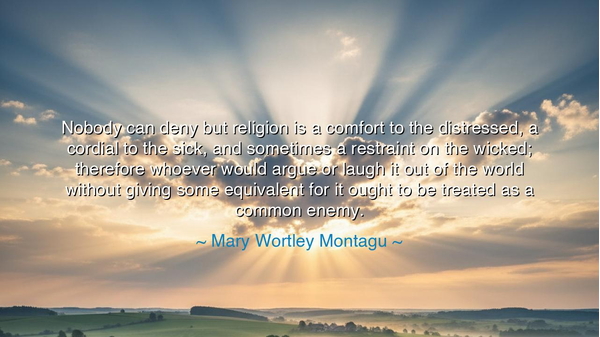
Nobody can deny but religion is a comfort to the distressed, a
Nobody can deny but religion is a comfort to the distressed, a cordial to the sick, and sometimes a restraint on the wicked; therefore whoever would argue or laugh it out of the world without giving some equivalent for it ought to be treated as a common enemy.






In the course of human existence, there are few forces more powerful than religion—a force that has served as a comfort to the distressed, a cordial to the sick, and, at times, a restraint on the wicked. Mary Wortley Montagu, in her reflection, encapsulates the profound role of religion in human society: "Nobody can deny but religion is a comfort to the distressed, a cordial to the sick, and sometimes a restraint on the wicked; therefore whoever would argue or laugh it out of the world without giving some equivalent for it ought to be treated as a common enemy." These words speak to the enduring value of religion in providing solace and meaning, especially in times of suffering, and to the consequences of dismissing something that holds such immense purpose in the lives of countless individuals.
The power of religion as a source of comfort has been recognized throughout history, from the ancient Sumerians to the Egyptians, the Greeks, and beyond. In each society, religion was often woven into the very fabric of daily life, offering not just answers to existential questions, but a system of values, hope, and guidance. For the Greeks, the gods of Olympus were not distant figures but active participants in the struggles of mortal life. Temples and rituals were built to seek favor in times of need, whether in times of war, sickness, or personal misfortune. The gods provided a sense of order and purpose, and the worship of them gave individuals a way to feel connected to something greater than themselves. Montagu’s words echo this ancient understanding: religion provides not just spiritual guidance, but emotional support, helping people to navigate the difficult waters of life.
Consider the story of Job, the Biblical figure who endured immense suffering, losing his wealth, his health, and his family. In the face of these overwhelming trials, Job turned to God, seeking comfort and meaning. His faith, though tested, became his anchor during the storm, and his prayers provided him with strength to endure. Job’s story is not just a tale of religious belief, but of how faith and prayer offer solace in moments of deep personal distress. His example demonstrates how religion serves as a cordial to the sick and a comfort to the distressed, giving those who are suffering something to hold on to, a hope that transcends their present circumstances.
Moreover, religion often acts as a restraint on the wicked, providing a moral framework that discourages evil actions and encourages individuals to live according to higher principles. The Ten Commandments in Judaism and Christianity, the Five Precepts in Buddhism, and the Sharia in Islam all offer codes of conduct that guide followers toward living morally upright lives. The threat of divine judgment serves as a powerful deterrent to harmful behaviors, while the promise of spiritual reward encourages good deeds. Throughout history, religious institutions have acted as guardians of moral order, offering both guidelines and restrictions to ensure the well-being of society. In this way, religion serves as a counterbalance to the wickedness that might otherwise arise in the absence of these spiritual checks.
Yet, Montagu warns that to ridicule or dismiss religion without offering an alternative would be to leave a void—a void that, if left unfilled, could lead to chaos and disillusionment. Religion, in her view, is not just a superstition or an outdated belief system, but a vital force in maintaining moral order and providing comfort. To undermine it without offering something of equal value in return is to weaken the social fabric and risk the collapse of societal values. The consequences of this, Montagu suggests, would be dire—those who attack religion without understanding its true value are enemies of the very stability and well-being that religion provides.
The lesson from Montagu’s words is clear: religion plays an indispensable role in the lives of individuals and societies. Its comfort is needed by those in pain, its moral framework is essential in restraining the wicked, and its sense of meaning offers guidance in times of uncertainty. While we may find ourselves questioning the traditional forms of religion in the modern world, we must remember the profound impact it has had throughout history in shaping human life. Even in our increasingly secular age, religion offers lessons that transcend specific belief systems—lessons about compassion, empathy, and the value of human connection.
In our own lives, we must ask ourselves how we might embody the comforting and restraining aspects of religion, even in the absence of traditional religious structures. What values do we live by that offer others a sense of hope, dignity, and moral guidance? Whether through acts of kindness, volunteerism, or simply being present for those who suffer, we can all serve as a source of comfort to those in distress. Moreover, by living according to principles that promote justice and compassion, we too can be part of the solution in a world that often seems lost in selfishness and despair. Montagu’s wisdom calls us to cherish the role of religion—and the deeper spiritual truths it imparts—while embracing its potential for good in a world that desperately needs it.






AAdministratorAdministrator
Welcome, honored guests. Please leave a comment, we will respond soon